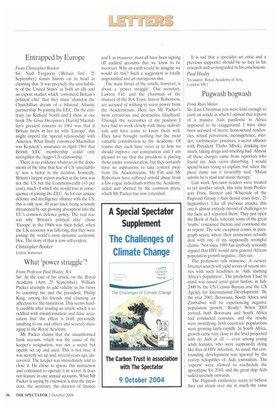Pugwash hogwash
From Rian Ma/an
Sir: Last Christmas you were kind enough to carry an article in which I opined that reports of a massive Aids pandemic in Africa appeared to be exaggerated. I have since been accused of incest, homosexual tendencies, sexual perversion, incompetence, murder, 'carbuncular' practices, a secret alliance with President Thabo Mbeki, drinking too much, taking drugs and smelling bad. Almost all these charges came from reporters who found my Aids views disturbing. I would spend hours trying to explain, but when the piece came out it invariably said, 'Malan admits he is mad and needs therapy.'
Last week Spectator readers were treated to yet another attack, this time from Professors Prins, Barnett and Whiteside of the Pugwash Group (Aids denial costs lives', 25 September). Like all previous attacks, this one is almost entirely devoid of challenges to the facts as I reported them. They just open the Book of Aids, reiterate some of the great 'truths' contained therein and command me to repent. The sole exception comes in paragraph seven, where their eminences actually deal with one of my supposedly wrongful claims. 'Not since 1989 has anybody seriously argued that HIV would turn general African population growth negative,' they say.
The professors talk nonsense. A cursory Internet search will yield scores of recent stories with such headlines as 'Aids slashing Africa's population'. The prediction I had in mind was issued amid great fanfare in July 2000 by the US Census Bureau and the US Agency for International Development: `By the year 2003, Botswana, South Africa and Zimbabwe will be experiencing negative population growth.' Really? When 2003 arrived, both Botswana and South Africa had conducted censuses, and the results were mortifying: both countries' populations were growing fairly rapidly. In South Africa, growth came very close to the level projected with no Aids at all — even among young adult females, who were supposedly dying like flies of HIV infection. As usual, this confounding development was ignored by the craven lickspittles of Aids journalism. The 'experts' were allowed to reschedule the apocalypse for 2010, and the great ship Aids sailed serenely onwards.
The Pugwash eminences seem to believe they can steam over me in much the same regal fashion. Their attack is replete with calumny but, aside from the instance above, devoid of reference to anything I actually said. For the record. then, I reported that computer modellers were lowering their Aids death estimates, that university and corporate sector surveys were finding lower infection rates than anticipated, that teachers were not dying en masse, and that the HIV rate in South Africa's prisons was 2.6 per cent, rather than 60. All these claims stand unchallenged, and yet the Pugwash professors insist that I am deranged, and that Aids is 'worse' than the Black Death.
The evidence they offer to support this contention is feeble. They tell us that Uganda's 'dependency ratio' rose 5 per cent in the 1990s, when HIV-relate d mortality was peaking, but what of it? In 1992 every Ugandan adult carried the burden of providing for 1.05 elderly and babies. By 1998, this number had edged up to 1.11. The Black Death exterminated up to half Europe's inhabitants. Aids caused a subtle shift in the average Ugandan's household expenses. Any similarity escapes me.
In truth, all claims of surging Aids-related mortality in Africa are a bit shaky when studied closely. As the British researcher John Blacker reports in the June issue of the journal Aids, they are 'all subject to potential errors and biases'. Blacker discerns an 'urgent need' for further research and warns that 'more data are needed before firm conclusions can be drawn'. The South African statistics cited by Prins et al. are specifically included in this caveat.
For the rest, I accept the professors' jests at the expense of my sanity in good spirit. After all, the best of them emerged from my own lips, m conversation with reporters who turned out to be immune to irony. I am also very sorry about missing the Pugwash conference. It was held in a seaside resort at the height of summer, when the Cape is at its loveliest. Participants flew in from across the planet. God knows how much it cost, what it accomplished, and how it differed from scores of similar conferences on the same theme. A friend who works in the field estimates that Aids conferences are now costing a billion dollars a year. Verily, such numbers are disturbing to my mental equilibrium. Can't they just communicate by email?
Rian Malan
wagon is spinning out of control and is in danger of taking the rest of us with it.
It is unusual, maybe unique, for a serving general to defend himself in print. That suggests that General Jackson is anxious — as indeed he should be. The querulous and curt character of his reply to (or attack on) Bruce Anderson is unsatisfactory and worrying.
Let us be clear first of all that any government's first duty is to ensure that we can defend our own country. That is manifestly not the case now, and in suggesting that it is Jackson falls into the government's Eurotrap. In other words, he is complicit in the argument that the only way we can defend ourselves is to subsume our armed forces into a European army as soon as possible. Much of what Jackson says is couched in jargon, perhaps to blind us to the real purpose of New Labour's defence plans, but his conduct — and Geoff Hoon's — remind one of the 1930s when the politicians were preparing for the wrong sort of war. The generals then were made of sterner stuff, and opposed their political masters.
As for the break-up of the regiments, Jackson is also guilty of dereliction. Instead of destroying these important pieces of our social fabric to pay for hundreds of clipboardtoting bureaucrats, he should be building them up. He should be recruiting more soldiers to the regiments. There is a need for them, But the fact is that New Labour will not allow the regiments to recruit more men.
Jackson may be a fine soldier, but his dismissive approach to Bruce Anderson is shocking. He must realise that many of this country's citizens believe the world to be in a structurally sclerotic state and wish our army to be enlarged, not reduced. In obedience to his mendacious political masters, he trots out the line that we are confronting a counterinsurgency situation in Iraq which will require more troops to be committed. He would do well to follow General Monro's example at Gallipoli and recommend that we withdraw every soldier forthwith, and then concentrate on ensuring that we can properly defend ourselves and our interests.
G. Cluff
London SW1



















































































 Previous page
Previous page